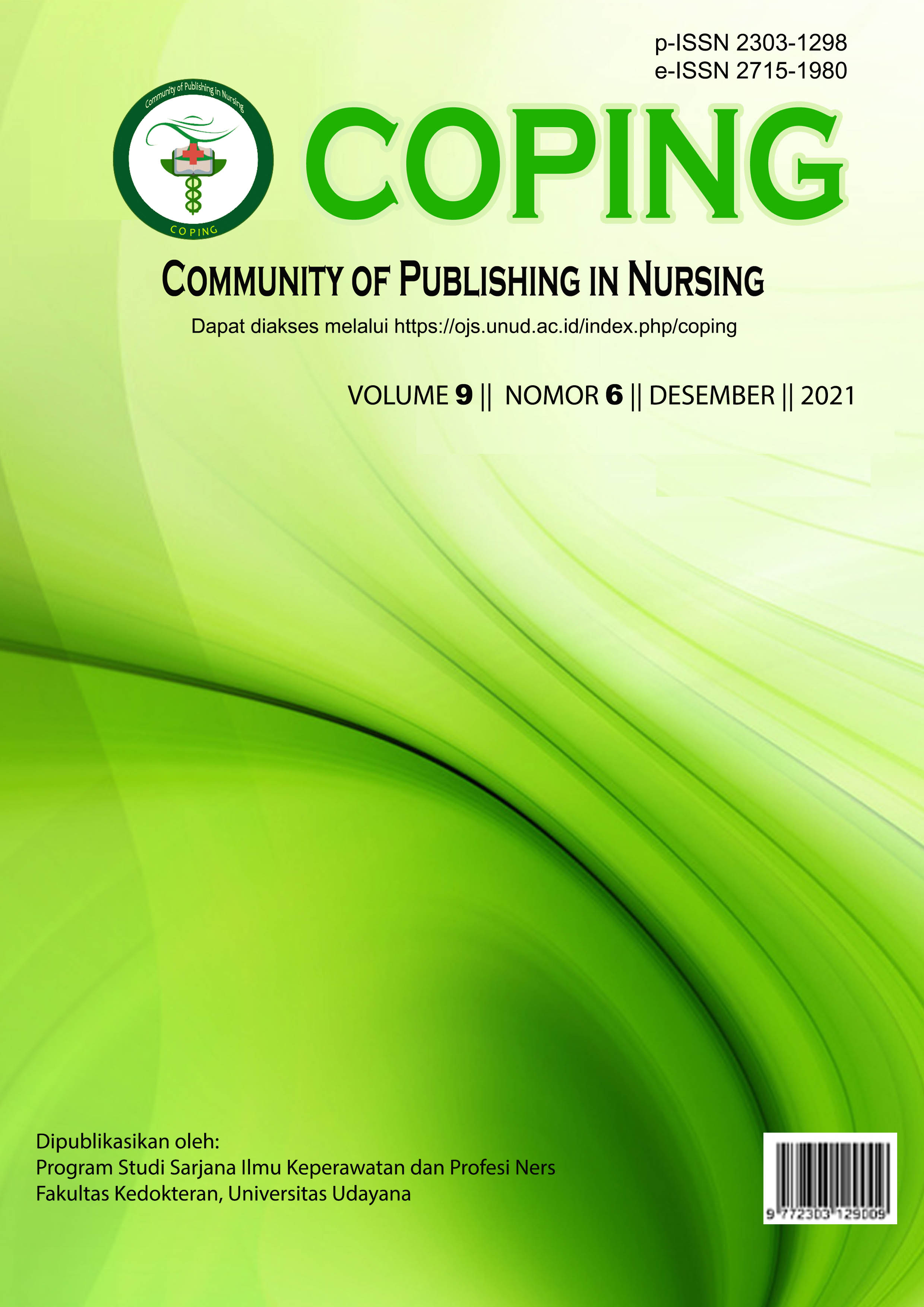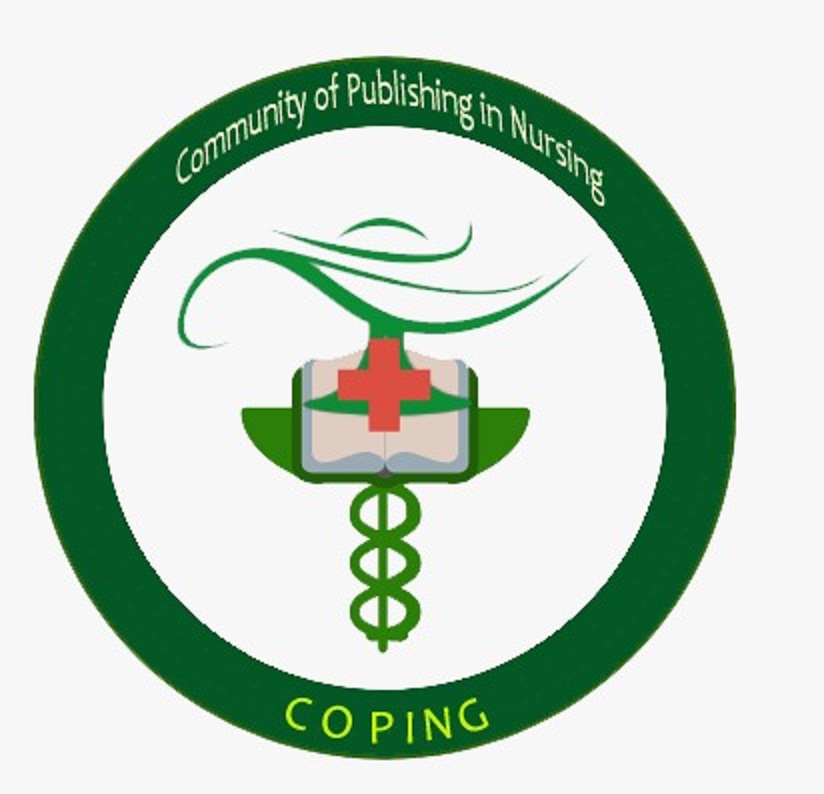EFEKTIFITAS INTERNET BASE COGNITIVE BEHAVIORAL THERAPY PADA GANGGUAN KECEMASAN: LITERATURE REVIEW
Abstract
Anxiety disorders are the most common of mental disorders and affect nearly 30 percent of adults at some point in their lives. iCBT (Internet Base Cognitive Behavioral Therapy) is an effective, easy-to-accept and practical health care in health care for anxiety disorders. The purpose of this study was to determine the effectiveness of Internet Base Cognitive Behavioral Therapy on anxiety disorders. The research method of this study uses non-Systematic Review Literature Review. The literature in this study was obtained through the online databases EBSCOHost, SpingerLink, Willey, ScienceDirect and ProQuest published from 2016 to 2021. Based on an analysis of the journals obtained, Internet Base Cognitive Behavioral Therapy has proven to be effective and cost-effective for use in the management of anxiety disorders. Mobile applications in smartphones are the most popular because of the convenience they provide. The use of iCBT will be more effective in its implementation with professional support from service providers.
Downloads
References
Bhugra, D., Till, A., & Sartorius, N. (2013). What is mental health? International Journal of Social Psychiatry, 59(1), 3–4. https://doi.org/10.1177/0020764012463315
Dahlin, M., Andersson, G., Magnusson, K., Johansson, T., Sjögren, J., Håkansson, A., Pettersson, M., Kadowaki, Å., Cuijpers, P., & Carlbring, P. (2016). Internet-delivered acceptance-based behaviour therapy for generalized anxiety disorder: A randomized controlled trial. Behaviour Research and Therapy, 77, 86–95. https://doi.org/10.1016/j.brat.2015.12.007
Eilert, N., Enrique, A., Wogan, R., Mooney, O., Timulak, L., & Richards, D. (2021). The effectiveness of Internet-delivered treatment for generalized anxiety disorder: An updated systematic review and meta-analysis. Depression and Anxiety, 38(2), 196–219. https://doi.org/10.1002/da.23115
Etzelmueller, A., Vis, C., Karyotaki, E., Baumeister, H., Titov, N., Berking, M., Cuijpers, P., Riper, H., & Ebert, D. D. (2020). Effects of internet-based cognitive behavioral therapy in routine care for adults in treatment for depression and anxiety: Systematic review and meta-analysis. Journal of Medical Internet Research, 22(8). https://doi.org/10.2196/18100
Fenger, M., Lindschou, J., Gluud, C., Winkel, P., Jørgensen, L., Kruse-Blinkenberg, S., & Lau, M. (2016). Internet-based self-help therapy with FearFighterTM versus no intervention for anxiety disorders in adults: Study protocol for a randomised controlled trial. Trials, 17(1), 1–10. https://doi.org/10.1186/s13063-016-1619-3
Ganasen, K. A., & Stein, D. J. (2012). The Biology and Efficacy of Combination Strategies for Anxiety Disorders. Psychobiological Approaches for Anxiety Disorders: Treatment Combination Strategies, 2012, 5–24. https://doi.org/10.1002/9781119945901.ch1
Hedman, E., Andersson, E., Lindefors, N., Andersson, G., Rück, C., & Ljótsson, B. (2013). Cost-effectiveness and long-term effectiveness of Internet-based cognitive behaviour therapy for severe health anxiety. Psychological Medicine, 43(2), 363–374. https://doi.org/10.1017/S0033291712001079
Kählke, F., Berger, T., Schulz, A., Baumeister, H., Berking, M., Cuijpers, P., Bruffaerts, R., Auerbach, R. P., Kessler, R. C., & Ebert, D. D. (2019a). Efficacy and cost-effectiveness of an unguided, internet-based self-help intervention for social anxiety disorder in university students: Protocol of a randomized controlled trial. BMC Psychiatry, 19(1), 1–13. https://doi.org/10.1186/s12888-019-2125-4
Kählke, F., Berger, T., Schulz, A., Baumeister, H., Berking, M., Cuijpers, P., Bruffaerts, R., Auerbach, R. P., Kessler, R. C., & Ebert, D. D. (2019b). Efficacy and cost-effectiveness of an unguided, internet-based self-help intervention for social anxiety disorder in university students: Protocol of a randomized controlled trial. BMC Psychiatry, 19(1), 1–12. https://doi.org/10.1186/s12888-019-2125-4
Mathiasen, K., Riper, H., Andersen, T. E., & Roessler, K. K. (2018). Guided internet-based cognitive behavioral therapy for adult depression and anxiety in routine secondary care: Observational study. Journal of Medical Internet Research, 20(11), 1–14. https://doi.org/10.2196/10927
Matthews, P., Topham, P., & Caleb-Solly, P. (2018). Interaction and engagement with an anxiety management app: Analysis using large-scale behavioral data. JMIR Mental Health, 5(4), 1–17. https://doi.org/10.2196/mental.9235
Mayo-Wilson, E., & Montgomery, P. (2013). Media-delivered cognitive behavioural therapy and behavioural therapy (self-help) for anxiety disorders in adults. Cochrane Database of Systematic Reviews, 2013(9). https://doi.org/10.1002/14651858.CD005330.pub4
Pedersen, M. K., Mohammadi, R., Mathiasen, K., & Elmose, M. (2020). Internet-based cognitive behavioral therapy for anxiety in an outpatient specialized care setting: A qualitative study of the patients’ experience of the therapy. Scandinavian Journal of Psychology, 61(6), 846–854. https://doi.org/10.1111/sjop.12665
Sokol, L., & Fox, M. (2019). The Comprehensive Clinician’s Guide to Cognitive Behavioral Therapy. PESI Publishing & Media. http://ebookcentral.proquest.com/lib/indonesiau-ebooks/detail.action?docID=6260922.
Stolz, T., Schulz, A., Krieger, T., Vincent, A., Urech, A., Moser, C., Westermann, S., & Berger, T. (2018). A mobile App for social anxiety disorder: A three-arm randomized controlled trial comparing mobile and PC-based guided self-help interventions. Journal of Consulting and Clinical Psychology, 86(6), 493–504. https://doi.org/10.1037/ccp0000301
Thase, M. E., Wright, J. H., Eells, T. D., Barrett, M. S., Wisniewski, S. R., Balasubramani, G. K., McCrone, P., & Brown, G. K. (2018). Improving the efficiency of psychotherapy for depression: Computer-assisted versus standard CBT. American Journal of Psychiatry, 175(3), 242–250. https://doi.org/10.1176/appi.ajp.2017.17010089
Villaggi, B., Provencher, H., Coulombe, S., Meunier, S., Radziszewski, S., Hudon, C., Roberge, P., Provencher, M. D., & Houle, J. (2015). Self-management strategies in recovery from mood and anxiety disorders. Global Qualitative Nursing Research, 2. https://doi.org/10.1177/2333393615606092
Wright, J. H., Mishkind, M., Eells, T. D., & Chan, S. R. (2019). Computer-Assisted Cognitive-Behavior Therapy and Mobile Apps for Depression and Anxiety. Current Psychiatry Reports, 21(7). https://doi.org/10.1007/s11920-019-1031-2







